Paul Busch (1955-2018)
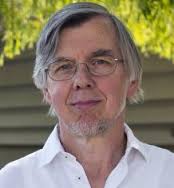
Paul Busch, born February 2, 1955, passed away June 9, 2018, after a short illness. He studied physics, mathematics and philosophy at the University of Cologne, where he received his doctorate in theoretical physics in 1982. His research interests focused on the foundations of quantum phyiscs and quantum information, in particular, the quantum theory of measurement, quantum theory and relativity, the theory of positive operator valued (POV) measures and the notion of unsharp quantum reality. He held post doctoral research positions at the University of Cologne, where he worked with Peter Mittelstaedt, and the Max Planck Intitute for Biophysical Chemistry in Göttingen. He was appointed University Docent in Theoretical Physics in Cologne in 1988, and was awarded the title of Professor there in 1994. He held appointments as visiting professor and research scholar at a number of institutions including Florida Atlantic University (1986), the University of Heidelberg (in Philosophy, 1994), Harvard University (hosted by Roy Glauber, Lyman Laboratory of Physics, 1994/5), and the Perimeter Institute of Theoretical Physics (2005-2007). He also held an adjunct professorship at the Department of Physics and Astronomy, University of Turku. He was professor of mathematical physics at the University of Hull and was Head of Department there from 2002 before joining the University of York in 2005. He was one of the editors of the “Foundations of Physics” journal and co-editor of the Springer monograph series "Fundamental Theories of Physics". He has published over 90 papers and is co-author of two monographs,
The Quantum Theory of Measurement (Springer 1991/96) and
Operational Quantum Physics (1995/97) (see
http://paulbusch.wixsite.com/research-page and his CV there). He was elected Member of the
Académie Internationale de Philosophie des Sciences in 2008, and Member of the
Foundational Questions Institute (FQXi) in 2015. He has been awarded a
Royal Society Leverhulme Trust Senior Research Fellowship (2017/18), and from 2016-2018, he was President of the
International Quantum Structures Association.
(Brigitte Falkenburg)
Bernard d'Espagnat (1921-2015)
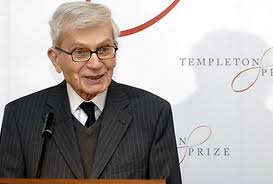 Bernard d’Espagnat, né le 22 août 1921 à Fourmagnac et mort le 1er août 2015 à Paris, est un physicien français.
Bernard d’Espagnat, né le 22 août 1921 à Fourmagnac et mort le 1er août 2015 à Paris, est un physicien français.Il est membre de l'Académie des sciences morales et politiques à partir de 1996, professeur émérite de l'Université Paris Orsay, désormais Université Paris Sud, membre de l'Académie internationale de philosophie des sciences (Bruxelles) à partir de 1975 et de l'université interdisciplinaire de Paris.
À partir de la fin des années 1960, il se distingue par ses travaux sur les enjeux philosophiques de la mécanique quantique et, en particulier, par sa conception du « réel voilé », qui constitue une approche originale du réalisme en physique.
Il est le fils du peintre Georges d’Espagnat (1870-1950), auquel il a consacré un ouvrage.
Bernard d'Espagnat a obtenu son doctorat à l'École polytechnique, qu'il a intégrée en 1942, et à l'Institut Henri-Poincaré (promotion Louis de Broglie). Il débute sa carrière en tant que chercheur au Centre national de la recherche scientifique(CNRS), de 1947 à 1957. Durant cette période, il travaille également avec le physicien Enrico Fermi à Chicago (1951-1952) et sur un projet de recherche mené par Niels Bohr à l'Institut de Copenhague (1953-1954). Il poursuit sa carrière scientifique en rejoignant le Centre d'études et de recherches nucléaires (CERN), à Genève, et comme physicien théorique à l'institution qui succède au CERN, l'Organisation européenne pour la recherche nucléaire (1954-1959).
De 1959 à sa retraite, en 1987, il enseigne à la Faculté des sciences de la Sorbonne. Il dirige le Laboratoire de physique théorique et des particules élémentaires de l'Université Paris-Sud 11, à Orsay (1980-1987). Par ailleurs, il est professeur invité à l’Université du Texas à Austin, en 1977, et à l'Université de Californie à Santa Barbara, en 1984. En 2009, il se voit décerner le prix Templeton.
Il a en particulier contribué à éclaircir les enjeux théoriques des expériences d’Alain Aspect sur le paradoxe EPR.
Ouvrages:
•Conceptions de la physique contemporaine ; les interprétations de la mécanique quantique et de la mesure (1965)
•Conceptual Foundations of Quantum Mechanics (1971)
•À la recherche du réel - Le regard d’un physicien, Gauthier-Villars, 1979 réédition Pocket, 1991
•Un Atome de sagesse, propos d’un physicien sur le réel voilé (1982)
•Nonseparability and the Tentative Descriptions of Reality (1984)
•Une incertaine réalité - Le monde quantique, la connaissance et la durée, Gauthier-Villars, 1985 réédition Fayard, 1993
•Penser la science ou les enjeux du savoir (1990)
•Georges d’Espagnat (1990)
•Regards sur la matière des quanta et des choses (en collaboration avec Étienne Klein) (1993)
•Le réel voilé - Analyse des concepts quantiques, Fayard, 1994
•Physique et réalité, un débat avec Bernard d’Espagnat (1997)
•Ondine et les feux du savoir. Carnets d'une petite sirène (1998)
•Traité de physique et de philosophie (2002)
•Candide et le physicien (avec Claude Saliceti, 2008)
Michael Detlefsen ( 1948 - 2019 )
 Michael Detlefsen
Michael Detlefsen (20 October 1948 – 21 October 2019) was a McMahon-Hank Professor of Philosophy at the
University of Notre Dame. His areas of special interest were logic, history of mathematics, philosophy of mathematics and epistemology.
Detlefsen began his academic career as an Assistant, and then Associate Professor, at the
University of Minnesota, Duluth in 1975. He remained there until 1983 but would also hold a position as a visiting scholar at the
University of Split, Croatia, from 1981 to 1982. He began teaching at Notre Dame as a Visiting Associate Professor in 1983 and became an Associate Professor there in 1984. He was promoted to full professor in 1989 and installed as a McMahon-Hank Professor of Philosophy in 2008. He held visiting professorships at the
University of Split (1981–1982), the
University of Konstanz (1987–1988, 1994), and at the
Paris Diderot University (2007). He held a senior
chaire d'excellence with the
Agence Nationale de la Recherche (ANR) in France from 2007 through 2011. He was a past president of the Philosophy of Mathematics Association (PMA).
Scholarly work
Detlefsen wrote a number of works on the foundational ideas of the German mathematician
David Hilbert, and other major nineteenth and twentieth century foundational thinkers, held research fellowships from various foundations including the International Research and Exchange Commission.
Stanislas Docks (1901-1985)
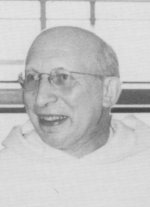 Le Père Stanislas Dockx o.p., fondateur des deux Académies AIPS et AISR.
Le Père Stanislas Dockx o.p., fondateur des deux Académies AIPS et AISR. Stanislas Dockx est né à Anvers (Belgique) le 31 mars 1901 dans une ancienne famille de commerçants anversois. Il fut d'abord orienté vers des études de commerce mais il fut vite bien plus intéressé par les problèmes philosophiques, sociologiques et religieux. Le 7 novembre 1920, il entra dans l'Ordre de St Dominique. Il fit son noviciat au couvent de La Sarte, près de Huy. De 1921 à 1924, il reçut sa formation philosophique au couvent de Gand. Au-delà des cours reçus, il tenait à lire directement les auteurs dans le texte. Il s'intéressa particulièrement à la métaphysique, à la logique, à la cosmologie, à la psychologie rationnelle et expérimentale. Vinrent ensuite les années d'études théologiques au couvent de Louvain. Il demanda alors l'autorisation de poursuivre des études en vue de l'obtention d'un doctorat en physique-mathématique mais ce projet fut retardé car il lui fut demandé d'assurer des cours (Ecriture Sainte, cosmologie, sciences naturelles) au Studium dominicain de La Sarte (de 1929 à 1936). Il eut cependant l'occasion, pendant ce temps, de suivre des cours de physique et de mathématique aux universités de Liège et de Louvain. Il élabora à ce moment une "Théorie fondamentale du système périodique des éléments" (éditée en 1959). En 1936, il fut nommé directeur du collège international des étudiants de l'université (dominicaine) de Fribourg (en Suisse). Mais il suivit lui-même des cours complémentaires de théologie et obtint, en 1938, le diplôme de docteur en théologie avec une thèse sur la théologie thomiste de la grâce ("Fils de Dieu par grâce", éditée en 1948). Il fut alors appelé au Studium dominicain de Varsovie où il assura (en latin) les cours de métaphysique et de théologie fondamentale. De retour en Belgique en 1939, il assura les cours de logique, de philosophie des sciences, de métaphysique et de cosmologie au Studium (philosophique) de Gand et ensuite des cours de théologie au Studium de Louvain, jusqu'en 1956. C'est pendant ces années qu'il fonda l'Institut International des Sciences Théoriques et tout d'abord la "classe des sciences profanes" (qui devint l'Académie Internationale de Philosophie des Sciences) dont le premier symposium eut lieu au Palais des Académies de Bruxelles en 1947. Un deuxième symposium eut lieu à Paris en 1949. Mais le suivant n'eut lieu qu'en 1961, étant donné ses obligations d'enseignement (et, de 1956 à 58, sa présence à Rome comme Pénitencier Apostolique à la basilique Sainte-Marie Majeure). A l'occasion du Concile Vatican II (1963-65), il fut sollicité comme expert ("peritus") par le patriarche grec-catholique Maximos IV. Le rapport qu'il rédigea dans le cadre de cette fonction ("Des pouvoirs dans l'Eglise",) fut distribué à tous les Pères conciliaires. La thèse, suivant laquelle le pouvoir des évêques tient à leur ordination comme évêque et non d'une délégation à partir du pape, fut largement discutée et se retrouva dans les textes conciliaires. Il fut aussi la cheville ouvrière de la levée des excommunications (de 1054) entre l'Eglise orthodoxe et l'Eglise catholique (le 7 décembre 1965) et des visites de Paul VI au Patriarche Athénagoras de Constantinople (25 juillet 1967) et de celui-ci à Rome (le 26 octobre 1967). C'est dans ce milieu des experts conciliaires qu'il trouva le vivier des théologiens (dont Mgr Ratzinger ...) désireux de continuer une recherche ouverte en théologie. Sollicités par le Père Dockx (qui avait également sollicité des théologiens des autres confessions chrétiennes), ils acceptèrent de devenir les membres fondateurs de l' Académie Internationale des Sciences Religieuses (la "classe des sciences sacrées" pressentie dès 1944). Le premier symposium de fondation eut lieu, dans la foulée, dans l'ancien couvent dominicain de Constance en mai 1964 sur le thème de la collégialité épiscopale. Agé de 63 ans, le Père Dockx se consacra dès lors entièrement aux Académies, jusqu'à ses 80 ans. Ses qualités humaines d'amabilité, de délicatesse, de discrétion, non moins que sa largeur d'esprit, son souci de la liberté de recherche et de parole et d'une recherche pointue chacun dans ses compétences donnèrent l'empreinte à son oeuvre. Après quelques accrocs de santé, il mourut le 7 novembre 1985 à Bruxelles, âgé de 84 ans.
Jean Gayon (1949-2018)
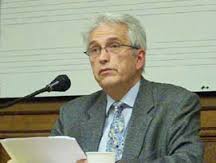
Professeur à l’Université Paris 1 Panthéon-Sorbonne, ancien directeur de l’IHPST, Jean Gayon s’est éteint le 28 avril 2018, à quelques semaines de son 69ème anniversaire.
Chercheur de double formation en philosophie et en biologie, Jean Gayon a consacré la majeure partie de ses recherches à l’histoire et à la philosophie de la biologie contemporaine, ses objets de prédilection étant les fondements conceptuels de la théorie de l’évolution, l’histoire de la génétique et de la biométrie. Il a aussi développé des réflexions éclairantes sur les aspects sociaux, politiques et éthiques des sciences de la vie et de la santé à l’époque contemporaine (en particulier sur l’eugénisme, le problème des races humaines et la biodiversité). Et il a aussi travaillé sur la philosophie générale des sciences et sur les rapports entre celle-ci et l’histoire des sciences : un sujet qui l’a occupé dans les derniers mois de sa vie, dans lesquels il n’a jamais cessé de travailler et d’animer la recherche collective au sein de l’IHPST et ailleurs.
Enseignant d’abord dans le secondaire, il a ensuite commencé sa carrière académique à l’Université de Bourgogne, où il a été nommé maître de conférences (1985-1990), puis professeur (1990-1997). Il a rejoint Paris en tant que professeur à l’Université Paris 7 (1997-2001), puis à l’Université Paris 1 Panthéon-Sorbonne (2001-2016), avant d’y être professeur émérite (depuis septembre 2016).
De 2010 à 2016 il a dirigé l’Institut d’Histoire et de Philosophie des Sciences et des Techniques.
Reçu à l’agrégation de philosophie en 1972 et devenu professeur de lycée à Maurepas (Yvelines), il retourne à l’université pendant neuf ans pour suivre une formation universitaire en biologie, du DEUG au DEA d’évolution de Claudine Petit, obtenu à l’université Paris 7 en 1983. Elle lui donne un pouvoir d’analyse exceptionnel dans les questions d’histoire de la biologie auxquelles il consacre les trente années suivantes.
Il soutient en 1989, sous la direction de François Dagognet, une thèse d’Etat sur la « théorie de la sélection naturelle : Darwin et après-Darwin ». Extrêmement documenté, nourri d’archives, ce travail explique comment ‘l’hypothèse de sélection naturelle’ avancée par Darwin se retrouve corroborée plusieurs décennies plus tard par la biologie évolutive moderne, selon un cheminement complexe qui passe par les biométriciens, Pearson et Galton, les premiers mendéliens, des études empiriques, puis la génétique des populations.
Le texte se clôt avec une analyse philosophique de la théorie dite neutraliste de Motoo Kimura, expliquant comment ce neutralisme prolonge plutôt qu’il ne récuse le sélectionnisme darwinien. Il deviendra un livre publié en français, Darwin et l’après Darwin (Kimé, 1992) puis en anglais sous le titre Darwinism’s struggle for survival en 1998 chez Cambridge University Press (1). Lu et commenté aussi bien par des philosophes et historiens des sciences que par des biologistes, ce texte est maintenant un classique de la littérature de philosophie / histoire de la biologie.
Suite à un long séjour aux Etats-Unis à cette époque, Jean Gayon a noué des contacts amicaux et professionnels avec la communauté des historiens et philosophes de la biologie, dont la structuration institutionnelle était alors en cours. Il sera l’un des membres fondateurs de la société de philosophie et d’histoire de biologie (ISHPSSB) dans les années 1990. Ces contacts américains, comme Richard Burian (Virginia Tech), Robert Brandon (Duke) ou Phillip Sloan (Notre Dame), seront étroitement associés à ses travaux, par exemple dans le domaine de l’histoire de la génétique.
Formé dans ce qu’il est convenu d’appeler la tradition de l’épistémologie historique française, proche de George Canguilhem et de Jacques Roger, Jean Gayon a initié un rapprochement entre celle-ci et la philosophie des sciences anglo-saxonne d’inspiration plus analytique, qui fut décisif pour ceux qu’il a formés, à Paris 7 puis Paris 1, et surtout pour l’orientation de l’IHPST, à partir de 2002.
L’œuvre philosophique de Jean Gayon, qui inclut outre le livre sur le darwinisme, plusieurs dizaines d’ouvrages dirigés et des centaines d’articles en anglais, français et parfois espagnol dans des revues internationales de philosophie ou d’histoire des sciences, couvre un grand nombre de questions qui peuvent se répartir selon les axes suivants:
L’épistémologie de la biologie évolutive, en particulier la question du concept de fonction, le rôle des concepts économiques en biologie évolutive, mais aussi l’histoire du transformisme - et ses grandes figures depuis Lamarck.
L’eugénisme - avec un intérêt massif pour Fisher, auquel Darwin et l'après-Darwin consacre des analyses qui font référence, et plus récemment l’amélioration humaine, human enhancement, qui communique avec les anciens projets eugénistes d’avant-guerre en leur ajoutant une dimension techniciste et médicale.
Les races, qui furent en leur temps un objet de préoccupation majeur pour les biologistes évolutionnaires fondateurs de la théorie classique (Théorie Synthétique) de l’évolution, souvent engagés dans une entreprise de réfutation scientifique des racismes.
La notion d’hérédité - aussi bien du point de vue de l’histoire de la génétique, de celui de son sens philosophique et son histoire au long cours.
L’épistémologie française, avec les figures régulièrement questionnées de Canguilhem et surtout Bachelard, et plus généralement l’interrogation sur les relations entre histoire des sciences et philosophie des sciences.
Professeur, Jean Gayon a formé comme directeur de thèses plusieurs générations d’étudiants et plusieurs ont obtenu le prix de thèse de Paris 1 ou le prix de la chancellerie de Paris. Les plus anciens sont aujourd’hui pour beaucoup d’entre eux chercheurs ou enseignants-chercheurs dans l’université française, spécialistes de philosophie et d’histoire de la biologie et de la médecine, mais parfois aussi de philosophie générale des sciences. Il a enseigné inlassablement en Licence et en Master, et introduit aux questions d’histoire de la biologie ou de philosophie de la génétique et de l’évolution des apprentis philosophes qui se tournèrent vers d’autres spécialités. Il n’est pas interdit de penser que le paysage français de philosophie académique de la biologie est en grande partie tributaire de Jean Gayon.
A l’Université Paris 1 Panthéon-Sorbonne, il a dirigé, de 2001 à 2005, le DEA d’Histoire et de Philosophie des Sciences, ancêtre du Master LOPHISC, l’Ecole Doctorale de philosophie de 2002 à 2010, le collège des Ecoles Doctorales de l’université Paris 1 de 2008 à 2010.
Responsable de l’équipe de philosophie de la biologie et de la médecine à l’IHPST depuis son arrivée, il a induit le tournant vers la philosophie des sciences qui caractérise cette équipe, en particulier par la constitution de réseaux de collaborations avec des philosophes étrangers (USA, Mexique, Canada, Royaume Uni…) comme avec des institutions de biologie (Muséum National d’Histoire Naturelle, Collège de France etc.)
Sous son impulsion se sont déroulés depuis 2004 plusieurs programmes de recherche qui jouèrent un rôle structurant pour cette équipe et qui ont abrité séminaires, colloques internationaux ou groupes de lecture : une ACI sur les fonctions, une ANR sur les rapports entre économie et évolution, un projet de ‘politique scientifique’ de Paris 1 sur l’histoire de la Théorie Synthétique de l’Evolution…
Comme directeur de l’IHPST, il a œuvré avec équilibre et enthousiasme à renforcer le rôle de cette institution sur la scène scientifique française et internationale, sans jamais privilégier son domaine de recherche, mais s’efforçant au contraire de faire prospérer toutes les équipes, en un contexte d’intense réciprocité. Puis, devenu professeur émérite, il avait récemment pris la direction de l’équipe ‘Histoire et philosophie des sciences’ pour y mener un travail de fond sur la manière d’articuler de nouveau ces deux disciplines, après l’inflexion vers la ‘philosophie des sciences’ des quinze dernières années.
Membre de la Leopoldina, membre titulaire de l’Académie internationale de philosophie des sciences, deux fois membre senior de l’IUF, membre de l’Institut international de philosophie, il avait participé au comité stratégique du CNRS dans les années 2000. Il a été aussi membre actif du Comité national d’histoire et philosophie des sciences (Académie des sciences), affilié à l’ICSU, et membre du Conseil d'Administration du CNHPS.
L’IHPST lui a consacré en 2017 des journées d’études pendant lesquelles des collègues philosophes et biologistes, français, mexicains et nord-américains, ont contribué à situer sa démarche. Ces communications font l’objet d’un ouvrage qui sort ce mois-ci (2).
Avant de nous quitter, il accepta aussi le projet d’un long livre d’interview de 525 pages mené par Victor Petit (3). Il y situe sa carrière par rapport aux traditions d’histoire des sciences en France et à la philosophie en général. Sa parution prochaine marquera une date dans l’histoire des recherches sur la connaissance.
Ce décès prématuré est une très grande perte pour toute la communauté philosophique française et internationale, et une très grande tristesse pour ses amis et ses proches. Nous ne perdons pas seulement un collègue. Nous perdons un maître, un guide, un exemple et un ami : un homme apparemment réservé, mais capable de grands élans d’amitié et d’humanité. Sans lui, nous nous sentons tous plus pauvres, autant comme scientifiques, que comme personnes. Nous ne l’oublierons pas, et tâcherons de continuer son œuvre et son enseignement.
Le directeur de l'IHPST, au nom de toute l'équipe.
(1) Gayon Jean. 1998. Darwinism's struggle for survival: heredity and the hypothesis of natural selection, Cambridge University Press, 516 p.
(2) Philosophie, histoire, biologie. Mélanges offerts à Jean Gayon, sous la direction de Francesca Merlin & Philippe Huneman. Paris, Editions Materiologiques.
(3) La connaissance de la vie aujourd’hui, Paris: ISTE, à paraître. Ce livre inclut comme le précédent une liste exhaustive des publications de Jean Gayon.
Gilles G. Granger (1920-2016)
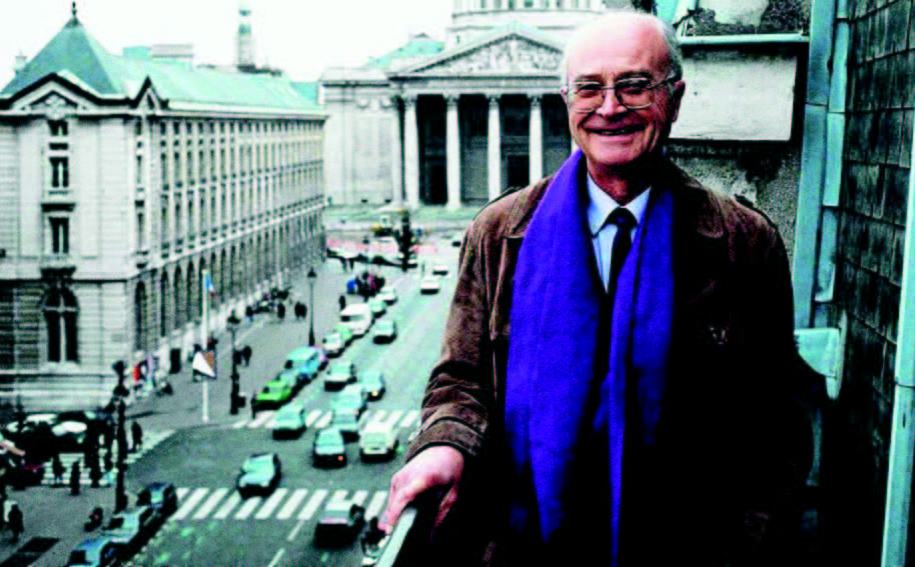
Gilles-Gaston Granger (January 28, 1920- August 24, 2016) was a French philosopher who contributed to philosophy of social sciences, philosophy of logic and mathematics, and history of philosophy, writing on philosophers such as Aristotle, Condorcet, Bolzano, and Wittgenstein. Interested in the variety of methods underlying scientific reasoning, he created in 1964, developed and directed until 1986 the Center for Comparative Epistemology at the University of Aix-en Provence. Elected in 1986 at College de France with a chair of the same name, he has left a substantial bibliography including nineteen books and one hundred and fifty articles. His work has been translated in nine languages.
Gaston Granger was born and grew up in Paris. His father was a carpenter. His mother and younger sister both died from tuberculosis when he was still a toddler. Given his excellent results in primary school, he was encouraged to become a school teacher, a cursus which, at the time, did not require a baccalaureate. One of his father's clients, however, himself a Professor, understood that the young man had exceptional intellectual talents. Thanks to his help, young Granger was admitted to Lycée Henri IV, and became in 1940 a student in the prestigious Ecole Normale Supérieure. He passionately attended Jean Cavaillès' seminar until the latter was arrested as a resistant in August 1942. Cavaillès' work on the Philosophy of Mathematics may have motivated him and his classmate Jules Vuillemin to study mathematics. Along with other ENS students who opposed force labour in Germany, however, he had to leave ENS to join a Resistance group in Creuse in 1943. After the war, he kept his resistant code name of Gilles.
He was nominated in 1947 Professor of Philosophy at the University of São Paulo, where he taught and published articles in Portuguese. Nominated in the University of Rennes (France) in 1955, he defended a State Doctoral thesis comprising two books about Economic Methodology and the Social Mathematics of Condorcet.
On line with these works, his next major opus, Formal Thought and the Sciences of Man (1960), deals with the mathematical models that contribute to formalization in the human sciences. It is based on the transcendental claim that mathematics have an a priori role in producing scientific knowledge. Scientific objectification is seen as a symbolic process through which what Grangerwill later call "formal contents" are generated. Scrutinized from the viewpoint of science in the making, the computational properties of the languages of science across fields of inquiry (linguistics, economics, psychology) are emphasized as reflecting specific rational practices of interest to the philosopher of science.
After two years spent in Congo as a Director of the Ecole Normale Supérieure of Central Africa, he was nominated Professor at the University of Aix-en Provence in 1964. Within a few years, he managed to set up an active research group. As a "Center for Comparative Epistemology", it specialized in the study of the modes of knowledge production across scientific fields, with a strong emphasis on the philosophy of mathematics and logic. With its research seminar and his library, this CNRS-funded unit would soon attract students and researchers from around the world, in particular from Canada, where Granger has been a regular guest speaker and invited Professor. A major event organized in 1969 by the Center was the Conference entitled "Wittgenstein and the problem of the philosophy of science". That same year, Granger published a book on Wittgenstein, followed, much later, by a translation of Wittgenstein's Tractatus Logico-Philosophicus.
Granger's Essay on the Philosophy of Style, published in 1968, highlights stylistic variations in the formal analysis of magnitude, geometry, vectors, linguistic, and action theory. These variations are seen as the proper object of philosophy, whose goal is to interpret individual ways of construing the relation between form and content. Philosophical knowledge is now seen as intimately linked to the exploration of stylistic comparisons between scientific modelizations. Pour une Connaissance Philosophique, published in 1988, develops further the concept of philosophical knowledge as an interpretive endeavour, focussing on the stylistic variations and their specific types of formal contents.
From 1986 to 1990, Granger held the chair of Comparative Epistemology at College de France. He authored no less that eight more books after his retirement. Gilles Granger was Doctor Honoris Causa of the Universities of São Paulo, (Brazil) and Sherbrook (Canada). He has exerted a deep influence on his students and colleagues. Two books have been devoted to his work.
Publications
• Lógica e filosofia das ciências, São Paulo: Editora Melhoramentos, 1955.
• La Raison, Paris, Presses Universitaires de France, 1955, 1984.
• Méthodologie économique, Paris: Presses Universitaires de France, 1955.
• La mathématique sociale du Marquis de Condorcet, Paris, Presses Universitaires de France, 1956,
Paris: Odile Jacob, 1989.
• Pensée formelle et sciences de l'homme, Paris, Aubier-Montaigne, 1960, augmented edition: 1967, Paris:
Archives Karéline, 2010.
• Wittgenstein, Paris: Seghers, 1969.
• Essai d'une philosophie du style, Paris: Armand Colin, 1969, Paris: Odile Jacob, 1987.
• La Théorie aristotélicienne de la science, Paris: Aubier, 1976.
• Langages et épistémologie, Paris, Klincksieck, 1979.
• Leçon inaugurale, Paris: Collège de France, 1987.
• Pour la connaissance philosophique, Paris: Odile Jacob, 1988.
• Invitation à la lecture de Wittgenstein, Aix-en-Provence: Alinéa, 1990.
• La Vérification, Paris: Odile Jacob, 1992.
• La Science et les sciences, Paris: Presses Universitaires de France, coll. "Que sais-je ?", 1993.
• Formes, opérations, objets, Paris: Vrin, 1994.
• Le probable, le possible et le virtuel, Paris: Odile Jacob, 1995.
• L'irrationnel, Paris: Odile Jacob, 1998.
• La pensée de l'espace, Paris: Odile Jacob, 1999.
• Sciences et réalité, Paris: Odile Jacob, 2001.
• Philosophie langage science, Paris: EDP Sciences, 2003.
Translations
• Wittgenstein, L. Carnets 1914-1916. Paris: Gallimard, 1971.
• Wittgenstein, L. Tractatus Logico-Philosophicus. Paris: Gallimard, 1972.
Collective Books on Gilles-Gaston Granger's Philosophy:
• La Connaissance Philosophique. Essais sur la philosophie de Gilles Gaston Granger. Joëlle Proust &
Elisabeth Schwartz (eds.), Paris: Presses Universitaires de France, 1995.
• La pensée de Gilles-Gaston Granger, (Antonia Soulez, ed.), Paris: Hermann, 2010.
(by Joëlle Proust).
Adolf Grünbaum (1923-2018)
From Wikipedia, the free encyclopedia
Life and career
During the second world war, Grünbaum was trained at Camp Ritchie, Maryland, and thus was one of the
Ritchie Boys. He was stationed in Berlin and interrogated highly-placed Nazis, returning to the United States in 1946.
Grünbaum obtained both his M.S. in physics (1948) and his Ph.D in philosophy (1951) from
Yale University. He was a chaired professor of Philosophy at
Lehigh University,
Bethlehem, Pennsylvania (1956–1960), after rising through the ranks there, starting in 1950, becoming a full professor in 1955.
In the fall of 1960, Grünbaum left Lehigh University to join the faculty of the
University of Pittsburgh, where he became the first Andrew Mellon Professor of Philosophy. In that year, he also became the founding Director of that University's Center for Philosophy of Science, serving as Director until 1978. He and the colleagues he recruited then built world-class
Philosophy and
History and Philosophy of Science Departments at the university. Several of these colleagues had come from
Yale University's Philosophy Department, starting in 1962. During this recruitment period the University of Pittsburgh appointed
Nicholas Rescher,
Wilfrid Sellars, Richard Gale,
Nuel Belnap,
Alan Ross Anderson, and Gerald Massey, among others.
In 2003, Grünbaum resigned from the Department of Philosophy at the University of Pittsburgh, while retaining his lifetime tenured Mellon Chair and all of his other affiliations at that university.
Grünbaum was Jewish. He died in November 2018 at the age of 95.
Philosophical work
Grünbaum was the author of nearly 400 articles and book chapters as well as books on space-time and the critique of psychoanalysis. He is often viewed as part of the American brand of
logical empiricism, associated especially with
Hans Reichenbach.
Grünbaum did not embrace the prevailing — especially among physical scientists —
Popperian philosophy of science, leading to some notoriety in the 1960s after he was ridiculed in print by the iconic physicist
Richard Feynman. A much-quoted exchange followed Grünbaum's neo-
Leibnizian suggestion that the
flow of time might be an illusion only in conscious entities, in which Feynman asked whether dogs, then cockroaches, were sufficiently conscious entities. Reportedly as a mark of further disdain, Feynman refused to let his name be printed, becoming instead the easily recognizable "Mr. X".
Some 40 years later, writer
Jim Holt would characterize Grünbaum as, in the 1950s, "the foremost thinker about the subtleties of space and time," and as, by the 2000s, "arguably the greatest living philosopher of science." Holt portrays a rationalist Grünbaum who rejects any hint of mysteriousness in the cosmos (a "great rejector").
Selected publications
- · Modern Science and Zeno's Paradoxes (first edition, 1967; second edition, 1968)
- · Geometry and Chronometry in Philosophical Perspective (1968)
- · Philosophical Problems of Space and Time (first edition, 1963; second edition, 1973)
- · The Foundations of Psychoanalysis (1984)
- · Validation in the Clinical Theory of Psychoanalysis: A Study in the Philosophy of Psychoanalysis (1993)
- · Collected Works, Volume 1 (ed. by Thomas Kupka): Scientific Rationality, the Human Condition, and 20th Century Cosmologies, Oxford University Press 2013. Volume 2: The Philosophy of Space & Time (ed. by Thomas Kupka), is forthcoming 2019; Volume 3: Lectures on Psychoanalysis (ed. by Thomas Kupka & Leanne Longwill), is forthcoming 2019 as well (both also with OUP).
Peter Kemp (1937-2018)
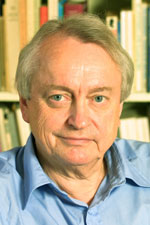 Peter Kemp, born January 24, 1937, passed away August 4, 2018. Originally educated in theology at the University of Aarhus, Denmark, but very early on he became interested in philosophy, in particular French philosophy, which he studied while attending various universities in Germany and France as a research scholar. Later he befriended Paul Ricoeur and his first major book Théorie de L’Engagement (1973) was influenced by his interaction with Ricoeur. A major feature of Kemp’s character was his commitments to humanistic principles and his active engagement in the public debate about many important cultural and societal issues. He believed that each and every human being was irreplaceable and this made him very critical towards modern technology. He saw the naïve use of technology as a threat to our understanding of human beings and to the way we treat them. For many years Peter Kemp was the director of the Center for Ethics and Law at the University of Copenhagen. In the years before retirement he spent his time as a professor of pedagogical philosophy at the University of Aarhus. Peter Kemp wrote approximately 40 books, some of which introduced French philosophy to a broader Danish audience. Another part of his oeuvre was written in French. Between 2003 and 2008 Kemp was elected as the President of the “Federation Internationale des Sociétés de Philosophie” (FISP). In 2016 he was appointed lifelong member of the “Académie des Sciences Morales et Politiques” (ASMP). A theme in Kemp’s philosophy was that we are all global citizens and with his death we missed a true humanist.
Peter Kemp, born January 24, 1937, passed away August 4, 2018. Originally educated in theology at the University of Aarhus, Denmark, but very early on he became interested in philosophy, in particular French philosophy, which he studied while attending various universities in Germany and France as a research scholar. Later he befriended Paul Ricoeur and his first major book Théorie de L’Engagement (1973) was influenced by his interaction with Ricoeur. A major feature of Kemp’s character was his commitments to humanistic principles and his active engagement in the public debate about many important cultural and societal issues. He believed that each and every human being was irreplaceable and this made him very critical towards modern technology. He saw the naïve use of technology as a threat to our understanding of human beings and to the way we treat them. For many years Peter Kemp was the director of the Center for Ethics and Law at the University of Copenhagen. In the years before retirement he spent his time as a professor of pedagogical philosophy at the University of Aarhus. Peter Kemp wrote approximately 40 books, some of which introduced French philosophy to a broader Danish audience. Another part of his oeuvre was written in French. Between 2003 and 2008 Kemp was elected as the President of the “Federation Internationale des Sociétés de Philosophie” (FISP). In 2016 he was appointed lifelong member of the “Académie des Sciences Morales et Politiques” (ASMP). A theme in Kemp’s philosophy was that we are all global citizens and with his death we missed a true humanist.
(Jan Faye)
Georg Kreisel (1923-2015)
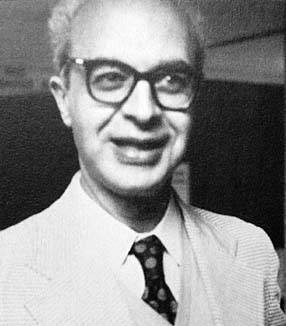
Georg Kreisel (September 15, 1923 in Graz – March 1, 2015 in Salzburg) was an Austrian-born mathematical logician who studied and worked in Great Britain and America. Kreisel came from a Jewish background; his family sent him to England before the Anschluss, where he studied mathematics at
Trinity College, Cambridge and then, during World War II, worked on military subjects. After the war he returned to Cambridge and received his doctorate. He taught at the
University of Reading until 1954 and then worked at the
Institute for Advanced Study from 1955 to 1957. Subsequently he taught at
Stanford University and the
University of Paris. Kreisel was appointed a professor at Stanford University in 1962 and remained on the faculty there until he retired in 1985.
Kreisel worked in various areas of logic, and especially in proof theory, where he is known for his so-called "unwinding" program, whose aim was to extract constructive content from superficially non-constructive proofs.
Kreisel was elected to the
Royal Society in 1966; Kreisel remained a close friend of
Francis Crick whom he had met in the Royal Navy during WWII.
While a student at Cambridge, Kreisel was the student most respected by
Ludwig Wittgenstein.
Ray Monk writes, "In 1944--when Kreisel was still only twenty-one--Wittgenstein shocked
Rush Rhees by declaring Kreisel to be the most able philosopher he had ever met who was also a mathematician."
Kreisel was also a close friend of the Anglo-Irish philosopher and novelist
Iris Murdoch. They met at Cambridge in 1947 during Murdoch's year of study there. Peter Conradi reports that Murdoch transcribed Kreisel's letters into her journals over the next fifty years. According to Conradi, "For half a century she nonetheless records variously Kreisel's brilliance, wit and sheer 'dotty' solipsistic strangeness, his amoralism, cruelty, ambiguous vanity and obscenity." Murdoch dedicated her 1971 novel
An Accidental Man to Kreisel and he became a (partial) model for several characters in other novels, including Marcus Vallar in
The Message to the Planet and Guy Openshaw in
Nuns and Soldiers.
Jean Ladrière (1921-2007)
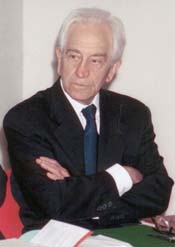 Jean Ladrière naquit à Nivelles (Belgique) en 1921. Au cours de ses études de philosophie à l'Université de Louvain, il s'intéressa particulièrement à la logique formelle (cours du prof. Dopp) et à la philosophie sociale (cours du chanoine Jacques Leclercq).
Jean Ladrière naquit à Nivelles (Belgique) en 1921. Au cours de ses études de philosophie à l'Université de Louvain, il s'intéressa particulièrement à la logique formelle (cours du prof. Dopp) et à la philosophie sociale (cours du chanoine Jacques Leclercq).
Son intérêt pour la logique formelle l'amena à faire des études complémentaires en mathématiques pures. Il consacra sa thèse de doctorat en philosophie (présentée en 1949) à l'étude des "implications du théorème de Gödel pour la théorie de la démonstration". Il rédigea encore un mémoire de licence en mathématiques sur les fonctions récursives (1951) et une thèse d'agrégation (1957) sur "Les limitations internes des formalismes" où, à partir des problèmes posés par le théorème de Gödel et des théorèmes apparentés, il montrait que le langage mathématique ne pouvait pas, ultimement, se passer du langage naturel. C'était donc le thème, très kantien, des limites de la rationalité qui était repris mais dans une perspective nouvelle, comme une exigence interne d'ouverture (et donc non interprété comme une limite) à d'autres champs de sens.
Dès 1958, il fut chargé d'enseigner la philosophie des sciences et des mathématiques à l'Institut Supérieur de Philosophie de Louvain et, par un regroupement bien réfléchi de cours, fit de la philosophie des sciences une section à part entière. A l'occasion de son enseignement, très suivi, il ne cessa de développer les problèmes d'épistémologie des sciences et fut un des premiers à introduire les épistémologues anglo-saxons et du Cercle de Vienne (dont, particulièrement, Wittgenstein) dans le monde philosophique francophone et d'en dégager les enjeux (grâce à sa maîtrise des langues, sa très large érudition et son magistral esprit de synthèse). De là, il s'intéressa aussi aux problèmes plus généraux de philosophie du langage, ce qui lui permettait de rejoindre son intuition première d'ouverture souhaitable ou même nécessaire entre les différents "champs de sens" ou langages, dont le langage théologique. Ce dernier et, plus largement, la confrontation entre la raison et la foi tint une place importante dans la réflexion de l'auteur. Il rédigea de très nombreux articles sur tous ces sujets (partiellement rassemblés dans trois volumes sous le titre: Articulation du sens, 1970,1984, 2004) et un livre: La science, le monde et la foi (Casterman, Tournai, 1972).
Son intérêt pour les sujets de société ne fut pas en reste. Au niveau académique, il reprit le cours de philosophie sociale du chanoine Leclercq pendant de nombreuses années. Il fut co-fondateur d'un Centre de recherche et d'information socio-politique (le CRISP, qui fait toujours référence comme Centre d'analyse indépendant et pertinent sur l'actualité socio-politique belge). En 1973, il publia: Vie sociale et destinée (Duculot, Gembloux), reprenant des thèmes-clés de ses cours. Dans les années '70, l'Unesco lui demanda de rédiger un rapport sur le défi de la science et de la technique par rapport aux cultures. Ce rapport fut publié sous le titre: Les enjeux de la rationalité (Aubier-Montaigne, Paris, 1977). Dans les années '80, il soutint la création et participa activement à l'activité d'un Centre d'études bioéthiques attaché à la faculté de médecine de l'Université de Louvain. En 1999 paraissait encore un volume: L'éthique dans l'univers de la rationalité (Fides, Montréal, 1999), rassemblant diverses contributions et formant une véritable introduction philosophique à l'éthique appliquée.
Il fit toute sa carrière à l'Université de Louvain (où il dirigea une centaine de thèses de doctorat !). Tous ses étudiants se souviendront de sa manière magique de mettre en valeur leurs (parfois maigres) connaissances. Il fut professeur invité dans de très nombreuses universités étrangères (en France, Portugal, Pologne, Congo, Chili, Brésil, Japon, Etats-Unis). Il participa à de multiples colloques et congrès. Toutes les personnes qui l'ont rencontré ont pu apprécier son extrême modestie et sa délicatesse infinie. Il reçut le titre de docteur honoris causa d'une dizaine d'universités. Il fut membre (et exerça des présidences) de nombreuses associations internationales de philosophie (dont l'AIPS et l'AISR).
Peter Mittelstaedt (1929-2014)
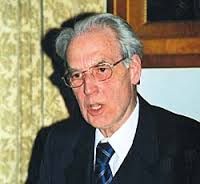
Peter Mittelstaedt (* 24. November 1929 in Leipzig; † 21. November 2014) war ein deutscher Physiker und Wissenschaftstheoretiker.
Leben:
Nach dem Studium der Physik an den Universitäten Jena, Bonn und Göttingen, mit Promotionsabschluss in Göttingen in Theoretischer Physik im Jahre 1956 bei Werner Heisenberg, hatte Mittelstaedt Forschungsaufenthalte beim CERN in Genf sowie am MIT in Cambridge, USA und am damaligen Max-Planck-Institut für Physik und Astrophysik in München, wo er sich auch im Jahre 1961 habilitierte. Seit 1965 war Mittelstaedt Professor für Theoretische Physik an der Universität zu Köln, seine Hauptarbeitsgebiete waren Philosophie der Naturwissenschaft, Wissenschaftstheorie und Logik sowie Grundlagen der Relativitätstheorie und Quantentheorie. 1968 und 1969 war er Dekan der Mathematisch-Naturwissenschaftlichen Fakultät, 1970 und 1971 Rektor der Universität, 1971 bis 1973 Prorektor, später Prorektor für Forschung in Köln. Mittelstaedt wurde 1995 emeritiert.
Publikationen:
Bücher
Philosophische Probleme der modernen Physik, BI Wissenschaftsverlag 1963 (7. Aufl. 1989)
Klassische Mechanik, BI 1970 (2. Aufl. 1995)
Die Sprache der Physik: Aufsätze und Vorträge, BI 1972
Der Zeitbegriff in der Physik – physikalische und philosophische Untersuchungen zum Zeitbegriff in der klassischen und relativistischen Physik, BI Wissenschaftsverlag 1976 (3. Aufl. 1989)
Quantum Logic, Dordrecht, Reidel 1978
Sprache und Realität in der modernen Physik, BI 1986, mit Paul Busch, Pekka J. Lahti The Quantum Theory of Measurement, Springer, Lecturenotes in Physics, 1991, 2. Auflage 1996
The Interpretation of Quantum Mechanics and the Measurement Process, Cambridge University Press 1998 (paperback 2004) mit Paul A. Weingartner Laws of Nature, Springer 2005
Rational Reconstructions of Modern Physics, Springer, Dordrecht 2011, ISBN 978-94-007-0076-5.
Herausgeber (Auszug)
Symposium on the Foundations of Modern Physics mit Pekka J. Lahti, 1985, 1987, 1990
Symposium on the Foundations of Modern Physics mit Paul Busch und Pekka J. Lahti, 1993
Wissenschaftliche Artikel siehe Homepage
Jesús Mosterín (1941-2017)
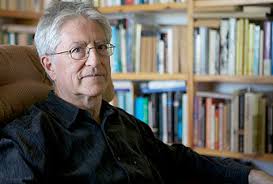 Jesús Mosterín (Bilbao, 24 sept. 1941-Barcelona, 4 oct. 2017)
Jesús Mosterín (Bilbao, 24 sept. 1941-Barcelona, 4 oct. 2017)
On the 4th of October, 2017, we heard the sad news that AIPS member Jesús Mosterín passed away. He was a highly relevant intellectual in the Spanish milieu, and well known abroad for his contributions to the philosophy of cosmology and biology. It seems not too far-fetched to say that he was a Spanish Russell: a logician by training, founder of the Barcelona group in logic, who unfolded his talent and opened up his interests to a much broader range of issues, becoming a public figure. His views were always marked by a rational, objectivist approach to the questions at stake, which earned him a reputation of being ‘a rationalist.’ But he was, more than that, a thinker of life, of the value of life.
Jesús Mosterín died of cancer caused by exposition to asbestos, an illness about which he spoke openly and with great lucidity two years ago (‘Una cita con la parca’, El País, March 2015). Lucidity is indeed something that comes naturally to mind when speaking of Jesús – an enlightened attitude, an openness of mind without dogmas, but with great rational demands.
He began studying mathematical logic in Germany, Münster, before coming back to Spain and settling in Barcelona. After 1996, he would abandon the Univ. of Barcelona and become a member of the Consejo Superior de Investigaciones Científicas (CSIC). In his early phase, as professor at Barcelona and founder of its logic group, he published texts on elementary logic, on set theory, on second-order logic. But during the 1970s some experiences would change his life and orientation. He started working for the editorial house Salvat and collaborating with renowned naturalist Felix Rodriguez de la Fuente in the publication of an encyclopaedia of animal life, Fauna. This would lead to a life-long engagement with related topics, including his opposition to bullfighting, reflections on the question of animal rights, and the presidency of Proyecto Gran Simio (Great Ape). He wrote books such as ¡Vivan los animales!, A favor de los toros, El triunfo de la compasión, El reino de los animales and El derecho de los animales, as well as many papers on these issues, thus becoming a well known public figure in these debates in Spain and Latin America.
As he wrote, “It is in our hands to take on the role of lucid guardians of the biosphere, or else abdicate our responsibility and become drunken witnesses of the disaster that we ourselves are causing.” En nuestras manos está asumir nuestro papel de guardianes lúcidos de la biosfera, o abdicar de nuestra responsabilidad y asistir como testigos borrachos al desastre que nosotros mismos estamos provocando.
The expansion of Mosterín’s range of interests had become clear in 1978 with the publication of Racionalidad y acción humana (several editions up to 2008). In this and other works, such as Filosofía de la cultura, his approach was marked by a highly interdisciplinary perspective, combining ideas from science with philosophical reflections. In his approach to culture, e.g., he liked to emphasize the different forms of cultural life in animals, concluding that we are not the only cultural animal. This line of work culminated with the publication in 2006 of La naturaleza humana, a book in which Mosterín fights to establish the great role of biological traits in human life and behaviour, against philosophical (or other) attempts to insist on the indeterminacy of the human.
Special mention deserves his Spanish edition of Kurt Gödel, Obras completas (Madrid: Alianza Editorial, 1981, 2006), uniting in a single volume all published works of Gödel, which came out before the English edition of collected works prepared by Feferman. And more recently the edition of Rudolf Carnap’s Untersuchungen zur allgemeinen Axiomatik, prepared with Thomas Bonk (Darmstadt: Wissenschaftliche Buchgesellschaft, 2000).
A particularly relevant contribution to the literature in philosophy of physics is the paper written jointly with J. Earman, A critical look at inflationary cosmology. Philos. Sci. 66 (1999), no. 1, 1–49.
The Spanish-speaking literature in philosophy of science is indebted to Mosterín for a very relevant reference book, the lengthy Diccionario de Lógica y Filosofía de la Ciencia, written in collaboration with Roberto Torretti (Madrid: Alianza Editorial, 2002; second edn. 2010). But there are many other contributions that could be mentioned here, among which I shall mention the book Conceptos y teorías en la ciencia (3rd edn, 2000). Los lógicos (2000, 2007), which offers highly readable presentations of the life and work of key figures in the history of modern logic – Frege, Russell, Cantor, Gödel, von Neumann, Turing. And the collection of papers Ciencia viva: Reflexiones sobre la aventura intelectual de nuestro tiempo (2001, 2006).
All of these works have gone through two or more editions, which is a clear indication of the public following of Mosterín’s well-informed, clear and insightful discussions of intellectual topics.
(by José Ferreirós)
Ilya Prigogine (1917-2003)
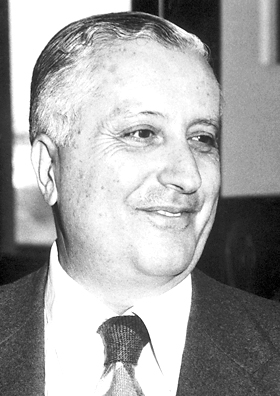 Ilya Prigogine (25 janvier 1917 à Moscou - 28 mai 2003) est un physicien et un chimiste belge d'origine russe. Il a reçu le prix Nobel de chimie en 1977, après avoir reçu la Médaille Rumford en 1976.
Ilya Prigogine (25 janvier 1917 à Moscou - 28 mai 2003) est un physicien et un chimiste belge d'origine russe. Il a reçu le prix Nobel de chimie en 1977, après avoir reçu la Médaille Rumford en 1976.
Il est connu surtout pour sa présentation sur les structures dissipatives et l'auto-organisation des systèmes, qui ont changé les approches par rapport aux théories classiques basées sur l'entropie. Ce en quoi il révèle une théorie parallèle à la théorie du chaos. Dans La Nouvelle Alliance. La métamorphose de la science, Prigogine développe la thèse suivante : la science classique considérait les phénomènes comme déterminés et réversibles, ce qui est en contradiction avec l'expérience courante. L'irréversibilité des phénomènes temporels caractéristique de la thermodynamique (non linéaire) réconcilie la physique avec le sens commun, tout en faisant date dans l'histoire de la thermodynamique.
Biographie
Il étudia la chimie à l'Université libre de Bruxelles en Belgique.
Ilya Prigogine explique ainsi son parcours : jeune émigré de Moscou d'origine juive, exilé en Allemagne puis en Belgique à Bruxelles pour fuir le nazisme, il voulut comprendre comment on arrivait à devoir fuir son propre pays. Il aborda la politique mais fut contraint d'étudier le droit. Voulant comprendre le comportement d'un accusé, il étudia la psychologie. Pour comprendre clairement la psychologie et la science du comportement, il buta sur le fonctionnement du cerveau humain. Ainsi, il étudia la biologie, la chimie et enfin la biochimie. En poussant plus loin pour comprendre les interactions chimiques, il étudia la physique des particules. De la physique, il passa à l'astrophysique et à la cosmologie. Il aborda alors les questions fondamentales : la matière, le vide, le temps et son sens unique (la flèche du temps). Pour comprendre la flèche du temps il dut étudier les structures dissipatives.
En 1977, il est lauréat du prix Nobel de chimie « pour ses contributions à la thermodynamique hors équilibre, particulièrement la théorie des structures dissipatives ».
Il cofonda le centre qui porte son nom à l'Université du Texas à Austin.
Il laissa également son nom à la Haute École Libre de Bruxelles Ilya Prigogine (HELB IP), associée à l'Université libre de Bruxelles (ULB). Il était membre de l'Académie roumaine.
Distinctions et récompenses
Il a reçu le prix Francqui en 1955 et le titre de docteur honoris causa de l'Université Jagellon de Cracovie en 1981. Il est lauréat du prix Nobel de chimie en 1977.
Publications
Introduction à la thermodynamique des processus irréversibles, Dunod, 1968, (ISBN2-87647-169-8)
- Structure, stabilité et fluctuations - avec P. Glansdorff, Masson, 1971, (ISBN2-2252-9690-1)
- Physique, temps et devenir - Masson, 1980, (ISBN2-2256-6792-6)
- La Nouvelle alliance - avec Isabelle Stengers, Gallimard, 1986, (ISBN2-0703-2324-2)
- Entre le temps et l'éternité - avec Isabelle Stengers, Fayard, 1988, (ISBN2-2130-2172-4)
- A la rencontre du complexe - avec Grégoire Nicolis, Presses universitaires de France, 1992, (ISBN2-1304-3606-4)
- Les Lois du chaos (Le leggi del caos) - Flammarion, 1993, transcription de deux conférences données à l'université de Milan en 1992, (ISBN2-0821-0220-3)
- Thermodynamique, des moteurs thermiques aux structures dissipatives - avec Dilip Kondepudi, Odile Jacob, 1996,(ISBN2-7381-0646-3)
- La Fin des certitudes, Odile Jacob, 1996, (ISBN2-7381-0330-8)
- L'Homme devant l'incertain - Odile Jacob, 2001, (ISBN2-7381-0831-8)
- Le Monde s'est-il créé tout seul ?, avec Henri Atlan, Joël De Rosnay, Albert Jacquard, Jean-Marie Pelt et Trinh Xuan Thuan, Albin Michel, 2008, (ISBN2-2261-7855-4)
Erhard Scheibe (1927-2010)
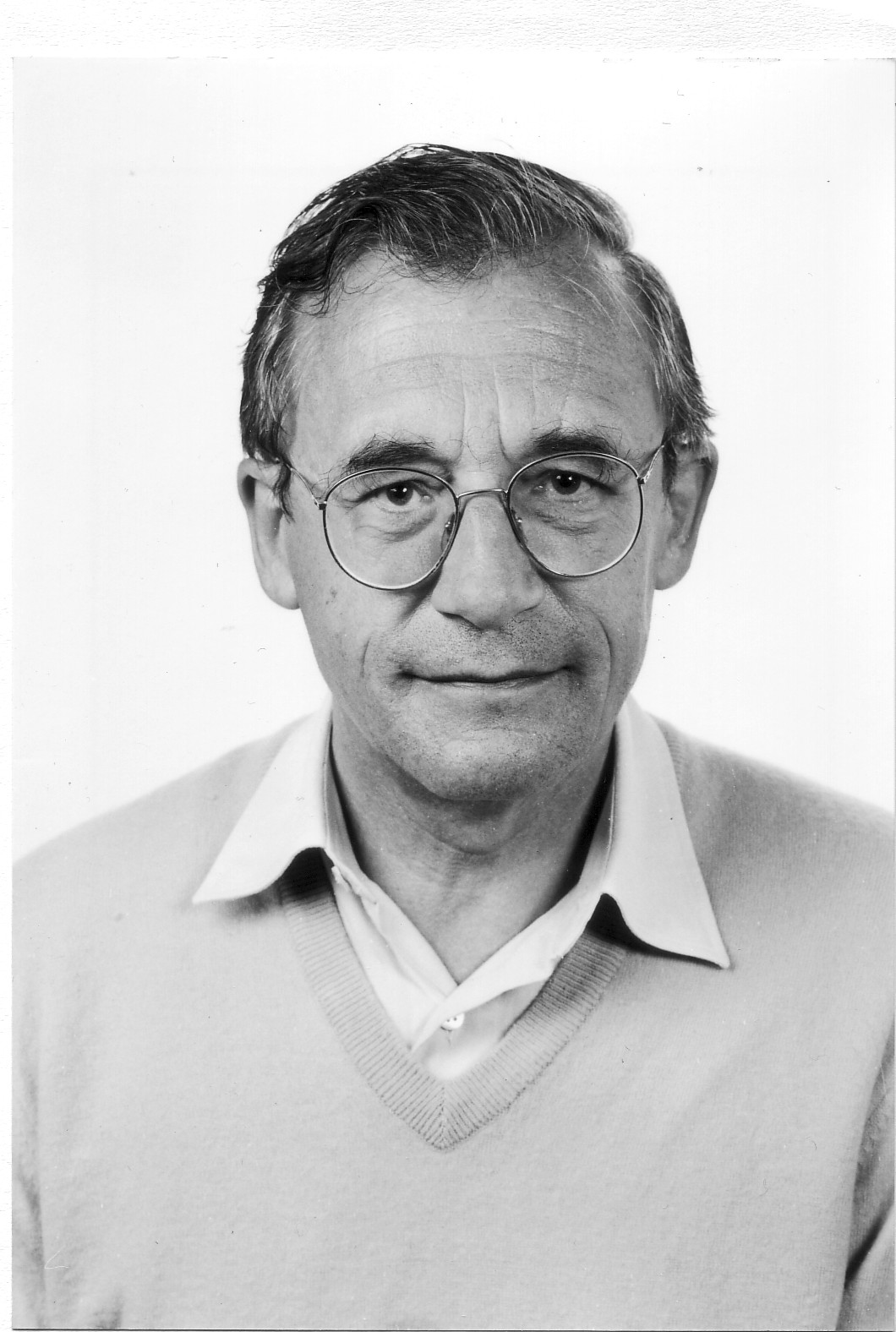
Erhard Scheibe was born in Berlin on September 24, 1927, a few days after the physicist Niels Bohr gave his famous “Como” lecture. Indeed, philosophical problems concerning the relations between quantum mechanics and classical physics stood at the centre of Scheibe’s work throughout his life. In 1946, he began to study mathematics and physics in Göttingen, where he belonged to the circle of young scholars gathered around Werner Heisenberg and Carl-Friedrich von Weizsäcker. In 1955, he there received his doctorate with a thesis in mathematics. Then he was working with Heisenberg at the Max Planck Institute for Physics in Göttingen. In 1957, he proceeded to Hamburg as von Weizsäcker’s assistant. He obtained his Habilitation in 1963 in Hamburg with a philosophical study of quantum mechanics,
Die kontingenten Aussagen in der Physik [The Contingent Propositions of Physics] (Athenäum, 1964). From 1964 to 1982 was a full Professor of Philosophy at Göttingen, and from 1982 to his retirement in 1992, at Heidelberg. In 1973, he published
The Logical Analysis of Quantum Mechanics (Pergamon Press, 1973). His lectures and essays covered themes from the concept of cause to scientific explanation, from Leibniz to Kant, from the laws of physics to the laws of nature, from the structure of physical theories to the progress of physics, not to mention the many technical articles on quantum mechanics and special or general relativity. Scheibe’s reputation grew. He became, not just one of the most important philosophers of the exact sciences, but the one who shaped the philosophy of physics in the German speaking world. In 1977, he became a full member of the
Academy of the Sciences of Göttingen. In 1979-80, he was a fellow at the
Center for Interdisciplinary Research (ZIF) at Bielefeld and at the
Center for Philosophy of Science in Pittsburgh. In 1982, he became a corresponding member of the
Academy of Science and Letters of Mainz, and of the
Académie Internationale de la Philosophie des Sciences. In 1987, he spent the winter term as an invited professor at the University of California in Irvine. In the academic year 1987/88, he was a fellow at the
Wissenschaftskolleg [Institute for Advanced Studies] in Berlin. In 1988, he held the Presidency of the Leibniz Committee of the Academy in Göttingen. From 1989 to 2002, he was a member of the Editorial Board of the journal
Philosophia Naturalis. After his retirement in 1992, he published a monumental investigation of the unity of physics in the face of incommensurable theories,
Die Reduktion physikalischer Theorien. Ein Beitrag zur Einheit der Physik [The Reduction of Physical Theories. A Contribution to the Unity of Physics] (Springer, Vol. I: 1997, Vol. II: 1999). A collection in English of Scheibe’s most important papers and lectures followed, making a great deal more of his work accessible to the English speaking philosophical world
. Between Rationalism and Empiricism: Selected Papers in the Philosophy of Physics (Springer, 2001). In 2003, Erhard Scheibe was made an honorary member of the
Gesellschaft für Analytische Philosophie (GAP). His final book,
Die Philosophie der Physiker [The Philosophy of the Physicists] (Beck, 2006, 2007), was wrested from the ravages of an increasingly debilitating illness, and Scheibe passed away on January 7, 2010, in Hamburg. (See
The Philosopher of the Physicists. The Legacy of Erhard Scheibe. In
: General Journal for Philosophy of Science 42 (2011), 1-15.)
(Brigitte Falkenburg)
Dudley Shapere (1928 - 2016)
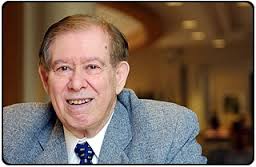
Dudley Shapere was an internationally prominent philosopher of science. He studied at Harvard University as an undergraduate and graduate, receiving a doctorate in philosophy in 1957. Subsequently, he taught at Ohio State University, the University of Chicago, the University of Illinois, and The University of Maryland at College Park. In 1984 he was appointed the Z. Smith Reynolds Professor of History and Philosophy of Science at Wake Forest, from where he retired and became a Professor Emeritus in 2001.
Shapere was a titular member of our Academy, as well as a fellow of the American Association for the Advancement of Science, the American Philosophy of Science Association, the American Psychological Association, the History of Science Society, and the American Philosophical Association. During his career, he held visiting appointments at numerous universities and research centers, notably Rockefeller University, Harvard University, and The Institute for Advanced Study, Princeton. He served at the U.S. National Science Foundation as Program Director in History and Philosophy of Science, 1966-1975. Shapere lectured worldwide regularly; his topics of highest demand were conceptual change, the concept of observation in science and philosophy, and the philosophical impact of evolutionary ideas in science. The author of numerous articles in scholarly journals, his books include Reason and the Search for Knowledge, Philosophical Problems of Natural Science, and Galileo: A Philosophical Study.
Dudley Shapere is survived by his wife of 42 years, Hannah Hardgrave; their daughters Elizabeth and Christine Anne; his son Alfred and daughter Catherine by his previous marriage to Alfreda Bingham; and five grandchildren
(by Alberto Cordero)
Patrick Suppes (1922-2014)
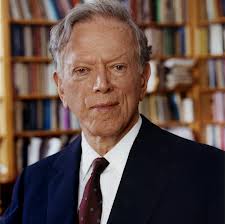
Patrick Colonel Suppes (/ˈsʊpɪs/; March 17, 1922 – November 17, 2014) was an American philosopher who made significant contributions to philosophy of science, the theory of measurement, the foundations of quantum mechanics, decision theory, psychology and educational technology. He was the Lucie Stern Professor of Philosophy Emeritus at Stanford University and until January 2010 was the Director of the Education Program for Gifted Youth also at Stanford.
Suppes was born on March 17, 1922, in Tulsa, Oklahoma. He grew up as an only child, later with a half brother George who was born in 1943 after Patrick had entered the army. His grandfather, C.E. Suppes, had moved to Oklahoma from Ohio. Suppes' father and grandfather were independent oil men. His mother died when he was a young boy. He was raised by his stepmother, who married his father before he was six years old. His parents did not have much formal education.
Suppes began college at the University of Oklahoma in 1939, but transferred to the University of Chicago in his second year, citing boredom with intellectual life in Oklahoma as his primary motivation. In his third year, at the insistence of his family, Suppes attended the University of Tulsa, majoring in physics, before entering the Army Reserves in 1942. In 1943 he returned to the University of Chicago and graduated with a B.S. in meteorology, and was stationed shortly thereafter at the Solomon Islands to serve during World War II.
Suppes was discharged from the Army Air Force in 1946. In January 1947 he entered Columbia University as a graduate student in philosophy as a student of Ernest Nagel and received a PhD in 1950. In 1952 he went to Stanford University, and from 1959 to 1992 he was the director of the Institute for Mathematical Studies in the Social Sciences (IMSSS). (He was later to become the Lucie Stern Professor of Philosophy, Emeritus, at Stanford.
In the 1960s Suppes and Richard C. Atkinson (the future president of the University of California) conducted experiments in using computers to teach math and reading to schoolchildren in the Palo Alto area. Stanford's Education Program for Gifted Youth and Computer Curriculum Corporation (CCC, now named Pearson Education Technologies) are indirect descendants of those early experiments. At Stanford, Suppes was instrumental in encouraging the development of high-technology companies that were springing up in the field of educational software up into the 1990s, (such as Bien Logic).
One computer used in Suppes and Atkinson's Computer-assisted Instruction (CAI) experiments was the specialized IBM 1500 Instructional System. Seeded by a research grant in 1964 from the U.S. Department of Education to the Institute for Mathematical Studies in the Social Sciences at Stanford University, the IBM 1500 CAI system was initially prototyped at the Brentwood Elementary School (Ravenswood City School District) in East Palo Alto, California by Suppes. The students first used the system in 1966.
During the 1950s and 1960s Suppes collaborated with Donald Davidson on decision theory, at Stanford. Their initial work followed lines of thinking which had been anticipated in 1926 by Frank P. Ramsey, and involved experimental testing of their theories, culminating in the 1957 monograph Decision Making: An Experimental Approach. Such commentators as Kirk Ludwig trace the origins of Davidson's theory of radical interpretation to his formative work with Suppes.
In 1965 he was elected as a member of the National Academy of Sciences for his work on mathematical psychology.
On November 13, 1990, President George H. W. Bush awarded Suppes with the prestigious President's National Medal of Science for work in Behavioral and Social Science.
In 1994 he was inducted as a Fellow of the Association for Computing Machinery. He is the laureate of the 2003 Lakatos Award for his contributions to the philosophy of science.
He is a member of the Norwegian Academy of Science and Letters.
Bibliography:
Suppes, Patrick; Arrow, Kenneth J.; Karlin, Samuel (1960). Mathematical models in the social sciences, 1959: Proceedings of the first Stanford symposium. Stanford, California: Stanford University Press. ISBN 9780804700214.
Including: Suppes, Patrick (1960), Stimulus-sampling theory for a continuum of response, pp. 348–363.
Suppes, Patrick (1972) (1960). Axiomatic Set Theory. Dover. Spanish translation by H. A. Castillo, Teoria Axiomatica de Conjuntos.
Suppes, Patrick (1984).Probabilistic Metaphysics, Blackwell Pub; Reprint edition (October 1986)
Humphreys, P. (1994). Patrick Suppes: Scientific Philosopher, Synthese Library (Springer-Verlag).
Vol. 1: Probability and Probabilistic Causality.
Vol. 2: Philosophy of Physics, Theory Structure and Measurement, and Action Theory.
Suppes, Patrick (1999) (1957). Introduction to Logic. Dover. Spanish translation by G. A. Carrasco, Introduccion a la logica simbolica. Chinese translation by Fu-Tseng Liu.
Suppes, Patrick (2002). Representation and Invariance of Scientific Structures. CSLI (distributed by the University of Chicago Press).
Suppes, Patrick; Hill, Shirley (2002) (1964). A First Course in Mathematical Logic. Dover. Spanish translation.
Suppes, Patrick; Luce, R. Duncn; Krantz, David; Tversky, Amos (2007) (1972). Foundations of Measurement, Vols. 1–3. Dover
Anne Sjerp Troelstra (1939-2019)

Anne Sjerp Troelstra (Maartensdijk,1939– Blaricum, 2019)was full professor of pure mathematics and foundations of mathematics at the University of Amsterdam. He described his research interests as ‘history and philosophy of constructivism; metamathematics of systems based on intuitionistic logic; proof theory'. Parts of his work have been taken up in computer science as well.
Troelstra was an academic grandson of L.E.J. Brouwer, and began his contributions to the latter’s foundational program with the dissertation Intuitionistic General Topology, supervised by Arend
Heyting, and defended in 1966. A one-year leave in 1966-1967 at Stanford, where his host was Georg Kreisel, was perhaps his second most formative experience, for both the topics and the convictions behind his main line of work, the formal metamathematics of intuitionistic mathematics. This influence was first seen in Troelstra's widely-read Principles of Intuitionism of 1969, which
originated in a lecture series he had given at the Summer Conference on Proof Theory and Intuitionism, Buffalo, NY, in 1968.
In 1970 Troelstra succeeded Heyting as full professor, and he remained at the University of Amsterdam until his retirement in 2000. Over the years, his work naturally became somewhat more diverse, and in particular he increasingly wrote also on the history and philosophy of intuitionism (and of constructive mathematics in general).
Another scientific and leisure interest of his was botany, which extended to accounts of journeys made to investigate natural history (botany, zoology, mineralogy, geology). This led to three books in Dutch, as well as the voluminous Bibliography of Natural History Travel Narratives.
Besides the Académie Internationale de Philosophie des Sciences, he was an elected member of the Royal Dutch Academy of Sciences (1976) and corresponding member of the Bavarian Academy of Sciences (1996).
In 1996 the Technische Universität München awarded him the F.L. Bauer prize for internationally outstanding contributions to theoretical computer science, citing his contributions to making intuitionistic logic useful in extracting algorithms and programs from mathematical proofs.
Troelstra's scientific archive is kept at the Noord-Hollands Archief in Haarlem.
His was a stern, ironical, and very scientific mind.
Principal publications:
- Principles of Intuitionism (Lecture Notes in Mathematics 95,Heidelberg: Springer, 1969)
- (with Georg Kreisel) Formal systems for some branches of intuitionistic analysis (Annals of Mathematical Logic, 1 (1970),
229-387)
- (with Jeff Zucker, Craig Smorynski, and William Howard) Metamathematical Investigations of Intuitionistic Arithmetic and
Analysis (Lecture Notes in Mathematics 344, Heidelberg: Springer, 1973)
- Analyzing choice sequences, Journal of Philosophical Logic 12 (1983), 197-260.
- (with Jane Kister and Dirk van Dalen) Omega-Bibliography of mathematical Logic. Vol. VI: Proof Theory and Constructive Mathematics (Heidelberg: Springer, 1987)
- (with Dirk van Dalen) Constructivism in Mathematics (Amsterdam:Elsevier, 1988, 2 volumes)
- (with Helmut Schwichtenberg) Basic Proof Theory (Cambridge Uiversity Press, 1996)
- Bibliography of Natural History Travel Narratives (Leiden: Brill, 2016)
Daniel Vanderveken (1949-2019)

Daniel Vanderveken était un Philosophe Québécois.
Docteur en Philosophie de l'
Université catholique de Louvain, il était Professeur à l'
Université du Québec à Trois-Rivières et membre titulaire de l'
Institut International de Philosophie. Spécialiste de la philosophie analytique et de la sémiotique, membre de l'Académie internationale de philosophie des sciences, directeur du Groupe de recherche sur la communication et le discours, il avait fondé avec le philosophe américain John Searle la logique des actes de discours. Il avit reçu le Prix d'excellence en recherche dans la catégorie « arts, sciences humaines et sociales ainsi que sciences de la gestion ».
Quelques-uns de ses ouvrages:
Actions, Rationalité & Décision - Actions, Rationality & Decision, avec Denis Fisette (codir.), Londres, Volume 6, College Publications, collection Cahiers de Logique et d'Épistémologie, 2008.
Logic, Thought and Action dans la collection Logic (dir.), Epistemology and the Unity of Science de Springer, 2005.
Les actes de discours : Essai de philosophie du langage et de l'esprit sur la signification des énonciations, Liège et Bruxelles, Pierre Mardaga, 1988.
Foundations of Illocutionary Logic, avec John Searle, Cambridge University Press, 1985.
 Paul Busch, born February 2, 1955, passed away June 9, 2018, after a short illness. He studied physics, mathematics and philosophy at the University of Cologne, where he received his doctorate in theoretical physics in 1982. His research interests focused on the foundations of quantum phyiscs and quantum information, in particular, the quantum theory of measurement, quantum theory and relativity, the theory of positive operator valued (POV) measures and the notion of unsharp quantum reality. He held post doctoral research positions at the University of Cologne, where he worked with Peter Mittelstaedt, and the Max Planck Intitute for Biophysical Chemistry in Göttingen. He was appointed University Docent in Theoretical Physics in Cologne in 1988, and was awarded the title of Professor there in 1994. He held appointments as visiting professor and research scholar at a number of institutions including Florida Atlantic University (1986), the University of Heidelberg (in Philosophy, 1994), Harvard University (hosted by Roy Glauber, Lyman Laboratory of Physics, 1994/5), and the Perimeter Institute of Theoretical Physics (2005-2007). He also held an adjunct professorship at the Department of Physics and Astronomy, University of Turku. He was professor of mathematical physics at the University of Hull and was Head of Department there from 2002 before joining the University of York in 2005. He was one of the editors of the “Foundations of Physics” journal and co-editor of the Springer monograph series "Fundamental Theories of Physics". He has published over 90 papers and is co-author of two monographs, The Quantum Theory of Measurement (Springer 1991/96) and Operational Quantum Physics (1995/97) (see http://paulbusch.wixsite.com/research-page and his CV there). He was elected Member of the Académie Internationale de Philosophie des Sciences in 2008, and Member of the Foundational Questions Institute (FQXi) in 2015. He has been awarded a Royal Society Leverhulme Trust Senior Research Fellowship (2017/18), and from 2016-2018, he was President of the International Quantum Structures Association.
Paul Busch, born February 2, 1955, passed away June 9, 2018, after a short illness. He studied physics, mathematics and philosophy at the University of Cologne, where he received his doctorate in theoretical physics in 1982. His research interests focused on the foundations of quantum phyiscs and quantum information, in particular, the quantum theory of measurement, quantum theory and relativity, the theory of positive operator valued (POV) measures and the notion of unsharp quantum reality. He held post doctoral research positions at the University of Cologne, where he worked with Peter Mittelstaedt, and the Max Planck Intitute for Biophysical Chemistry in Göttingen. He was appointed University Docent in Theoretical Physics in Cologne in 1988, and was awarded the title of Professor there in 1994. He held appointments as visiting professor and research scholar at a number of institutions including Florida Atlantic University (1986), the University of Heidelberg (in Philosophy, 1994), Harvard University (hosted by Roy Glauber, Lyman Laboratory of Physics, 1994/5), and the Perimeter Institute of Theoretical Physics (2005-2007). He also held an adjunct professorship at the Department of Physics and Astronomy, University of Turku. He was professor of mathematical physics at the University of Hull and was Head of Department there from 2002 before joining the University of York in 2005. He was one of the editors of the “Foundations of Physics” journal and co-editor of the Springer monograph series "Fundamental Theories of Physics". He has published over 90 papers and is co-author of two monographs, The Quantum Theory of Measurement (Springer 1991/96) and Operational Quantum Physics (1995/97) (see http://paulbusch.wixsite.com/research-page and his CV there). He was elected Member of the Académie Internationale de Philosophie des Sciences in 2008, and Member of the Foundational Questions Institute (FQXi) in 2015. He has been awarded a Royal Society Leverhulme Trust Senior Research Fellowship (2017/18), and from 2016-2018, he was President of the International Quantum Structures Association. Bernard d’Espagnat, né le 22 août 1921 à Fourmagnac et mort le 1er août 2015 à Paris, est un physicien français.
Bernard d’Espagnat, né le 22 août 1921 à Fourmagnac et mort le 1er août 2015 à Paris, est un physicien français. Michael Detlefsen (20 October 1948 – 21 October 2019) was a McMahon-Hank Professor of Philosophy at the University of Notre Dame. His areas of special interest were logic, history of mathematics, philosophy of mathematics and epistemology.
Michael Detlefsen (20 October 1948 – 21 October 2019) was a McMahon-Hank Professor of Philosophy at the University of Notre Dame. His areas of special interest were logic, history of mathematics, philosophy of mathematics and epistemology. Le Père Stanislas Dockx o.p., fondateur des deux Académies AIPS et AISR.
Le Père Stanislas Dockx o.p., fondateur des deux Académies AIPS et AISR. Professeur à l’Université Paris 1 Panthéon-Sorbonne, ancien directeur de l’IHPST, Jean Gayon s’est éteint le 28 avril 2018, à quelques semaines de son 69ème anniversaire.
Professeur à l’Université Paris 1 Panthéon-Sorbonne, ancien directeur de l’IHPST, Jean Gayon s’est éteint le 28 avril 2018, à quelques semaines de son 69ème anniversaire. Gilles-Gaston Granger (January 28, 1920- August 24, 2016) was a French philosopher who contributed to philosophy of social sciences, philosophy of logic and mathematics, and history of philosophy, writing on philosophers such as Aristotle, Condorcet, Bolzano, and Wittgenstein. Interested in the variety of methods underlying scientific reasoning, he created in 1964, developed and directed until 1986 the Center for Comparative Epistemology at the University of Aix-en Provence. Elected in 1986 at College de France with a chair of the same name, he has left a substantial bibliography including nineteen books and one hundred and fifty articles. His work has been translated in nine languages.
Gilles-Gaston Granger (January 28, 1920- August 24, 2016) was a French philosopher who contributed to philosophy of social sciences, philosophy of logic and mathematics, and history of philosophy, writing on philosophers such as Aristotle, Condorcet, Bolzano, and Wittgenstein. Interested in the variety of methods underlying scientific reasoning, he created in 1964, developed and directed until 1986 the Center for Comparative Epistemology at the University of Aix-en Provence. Elected in 1986 at College de France with a chair of the same name, he has left a substantial bibliography including nineteen books and one hundred and fifty articles. His work has been translated in nine languages.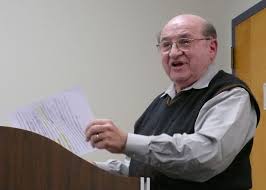 Adolf Grünbaum (May 15, 1923 – November 15, 2018) was a German-American philosopher of science and a critic of psychoanalysis, as well as Karl Popper's philosophy of science. He was the first Andrew Mellon Professor of Philosophy at the University of Pittsburgh from 1960 until his death, and also served as Co-Chairman of its Center for Philosophy of Science (from 1978), Research Professor of Psychiatry (from 1979), and Primary Research Professor in the Department of History and Philosophy of Science (from 2006). His works include Philosophical Problems of Space and Time (1963), The Foundations of Psychoanalysis (1984), and Validation in the Clinical Theory of Psychoanalysis (1993).
Adolf Grünbaum (May 15, 1923 – November 15, 2018) was a German-American philosopher of science and a critic of psychoanalysis, as well as Karl Popper's philosophy of science. He was the first Andrew Mellon Professor of Philosophy at the University of Pittsburgh from 1960 until his death, and also served as Co-Chairman of its Center for Philosophy of Science (from 1978), Research Professor of Psychiatry (from 1979), and Primary Research Professor in the Department of History and Philosophy of Science (from 2006). His works include Philosophical Problems of Space and Time (1963), The Foundations of Psychoanalysis (1984), and Validation in the Clinical Theory of Psychoanalysis (1993). Peter Kemp, born January 24, 1937, passed away August 4, 2018. Originally educated in theology at the University of Aarhus, Denmark, but very early on he became interested in philosophy, in particular French philosophy, which he studied while attending various universities in Germany and France as a research scholar. Later he befriended Paul Ricoeur and his first major book Théorie de L’Engagement (1973) was influenced by his interaction with Ricoeur. A major feature of Kemp’s character was his commitments to humanistic principles and his active engagement in the public debate about many important cultural and societal issues. He believed that each and every human being was irreplaceable and this made him very critical towards modern technology. He saw the naïve use of technology as a threat to our understanding of human beings and to the way we treat them. For many years Peter Kemp was the director of the Center for Ethics and Law at the University of Copenhagen. In the years before retirement he spent his time as a professor of pedagogical philosophy at the University of Aarhus. Peter Kemp wrote approximately 40 books, some of which introduced French philosophy to a broader Danish audience. Another part of his oeuvre was written in French. Between 2003 and 2008 Kemp was elected as the President of the “Federation Internationale des Sociétés de Philosophie” (FISP). In 2016 he was appointed lifelong member of the “Académie des Sciences Morales et Politiques” (ASMP). A theme in Kemp’s philosophy was that we are all global citizens and with his death we missed a true humanist.
Peter Kemp, born January 24, 1937, passed away August 4, 2018. Originally educated in theology at the University of Aarhus, Denmark, but very early on he became interested in philosophy, in particular French philosophy, which he studied while attending various universities in Germany and France as a research scholar. Later he befriended Paul Ricoeur and his first major book Théorie de L’Engagement (1973) was influenced by his interaction with Ricoeur. A major feature of Kemp’s character was his commitments to humanistic principles and his active engagement in the public debate about many important cultural and societal issues. He believed that each and every human being was irreplaceable and this made him very critical towards modern technology. He saw the naïve use of technology as a threat to our understanding of human beings and to the way we treat them. For many years Peter Kemp was the director of the Center for Ethics and Law at the University of Copenhagen. In the years before retirement he spent his time as a professor of pedagogical philosophy at the University of Aarhus. Peter Kemp wrote approximately 40 books, some of which introduced French philosophy to a broader Danish audience. Another part of his oeuvre was written in French. Between 2003 and 2008 Kemp was elected as the President of the “Federation Internationale des Sociétés de Philosophie” (FISP). In 2016 he was appointed lifelong member of the “Académie des Sciences Morales et Politiques” (ASMP). A theme in Kemp’s philosophy was that we are all global citizens and with his death we missed a true humanist. Georg Kreisel (September 15, 1923 in Graz – March 1, 2015 in Salzburg) was an Austrian-born mathematical logician who studied and worked in Great Britain and America. Kreisel came from a Jewish background; his family sent him to England before the Anschluss, where he studied mathematics at Trinity College, Cambridge and then, during World War II, worked on military subjects. After the war he returned to Cambridge and received his doctorate. He taught at the University of Reading until 1954 and then worked at the Institute for Advanced Study from 1955 to 1957. Subsequently he taught at Stanford University and the University of Paris. Kreisel was appointed a professor at Stanford University in 1962 and remained on the faculty there until he retired in 1985.
Georg Kreisel (September 15, 1923 in Graz – March 1, 2015 in Salzburg) was an Austrian-born mathematical logician who studied and worked in Great Britain and America. Kreisel came from a Jewish background; his family sent him to England before the Anschluss, where he studied mathematics at Trinity College, Cambridge and then, during World War II, worked on military subjects. After the war he returned to Cambridge and received his doctorate. He taught at the University of Reading until 1954 and then worked at the Institute for Advanced Study from 1955 to 1957. Subsequently he taught at Stanford University and the University of Paris. Kreisel was appointed a professor at Stanford University in 1962 and remained on the faculty there until he retired in 1985. Jean Ladrière naquit à Nivelles (Belgique) en 1921. Au cours de ses études de philosophie à l'Université de Louvain, il s'intéressa particulièrement à la logique formelle (cours du prof. Dopp) et à la philosophie sociale (cours du chanoine Jacques Leclercq).
Jean Ladrière naquit à Nivelles (Belgique) en 1921. Au cours de ses études de philosophie à l'Université de Louvain, il s'intéressa particulièrement à la logique formelle (cours du prof. Dopp) et à la philosophie sociale (cours du chanoine Jacques Leclercq). Peter Mittelstaedt (* 24. November 1929 in Leipzig; † 21. November 2014) war ein deutscher Physiker und Wissenschaftstheoretiker.
Peter Mittelstaedt (* 24. November 1929 in Leipzig; † 21. November 2014) war ein deutscher Physiker und Wissenschaftstheoretiker. Jesús Mosterín (Bilbao, 24 sept. 1941-Barcelona, 4 oct. 2017)
Jesús Mosterín (Bilbao, 24 sept. 1941-Barcelona, 4 oct. 2017) Ilya Prigogine (25 janvier 1917 à Moscou - 28 mai 2003) est un physicien et un chimiste belge d'origine russe. Il a reçu le prix Nobel de chimie en 1977, après avoir reçu la Médaille Rumford en 1976.
Ilya Prigogine (25 janvier 1917 à Moscou - 28 mai 2003) est un physicien et un chimiste belge d'origine russe. Il a reçu le prix Nobel de chimie en 1977, après avoir reçu la Médaille Rumford en 1976. Erhard Scheibe was born in Berlin on September 24, 1927, a few days after the physicist Niels Bohr gave his famous “Como” lecture. Indeed, philosophical problems concerning the relations between quantum mechanics and classical physics stood at the centre of Scheibe’s work throughout his life. In 1946, he began to study mathematics and physics in Göttingen, where he belonged to the circle of young scholars gathered around Werner Heisenberg and Carl-Friedrich von Weizsäcker. In 1955, he there received his doctorate with a thesis in mathematics. Then he was working with Heisenberg at the Max Planck Institute for Physics in Göttingen. In 1957, he proceeded to Hamburg as von Weizsäcker’s assistant. He obtained his Habilitation in 1963 in Hamburg with a philosophical study of quantum mechanics, Die kontingenten Aussagen in der Physik [The Contingent Propositions of Physics] (Athenäum, 1964). From 1964 to 1982 was a full Professor of Philosophy at Göttingen, and from 1982 to his retirement in 1992, at Heidelberg. In 1973, he published The Logical Analysis of Quantum Mechanics (Pergamon Press, 1973). His lectures and essays covered themes from the concept of cause to scientific explanation, from Leibniz to Kant, from the laws of physics to the laws of nature, from the structure of physical theories to the progress of physics, not to mention the many technical articles on quantum mechanics and special or general relativity. Scheibe’s reputation grew. He became, not just one of the most important philosophers of the exact sciences, but the one who shaped the philosophy of physics in the German speaking world. In 1977, he became a full member of the Academy of the Sciences of Göttingen. In 1979-80, he was a fellow at the Center for Interdisciplinary Research (ZIF) at Bielefeld and at the Center for Philosophy of Science in Pittsburgh. In 1982, he became a corresponding member of the Academy of Science and Letters of Mainz, and of the Académie Internationale de la Philosophie des Sciences. In 1987, he spent the winter term as an invited professor at the University of California in Irvine. In the academic year 1987/88, he was a fellow at the Wissenschaftskolleg [Institute for Advanced Studies] in Berlin. In 1988, he held the Presidency of the Leibniz Committee of the Academy in Göttingen. From 1989 to 2002, he was a member of the Editorial Board of the journal Philosophia Naturalis. After his retirement in 1992, he published a monumental investigation of the unity of physics in the face of incommensurable theories, Die Reduktion physikalischer Theorien. Ein Beitrag zur Einheit der Physik [The Reduction of Physical Theories. A Contribution to the Unity of Physics] (Springer, Vol. I: 1997, Vol. II: 1999). A collection in English of Scheibe’s most important papers and lectures followed, making a great deal more of his work accessible to the English speaking philosophical world. Between Rationalism and Empiricism: Selected Papers in the Philosophy of Physics (Springer, 2001). In 2003, Erhard Scheibe was made an honorary member of the Gesellschaft für Analytische Philosophie (GAP). His final book, Die Philosophie der Physiker [The Philosophy of the Physicists] (Beck, 2006, 2007), was wrested from the ravages of an increasingly debilitating illness, and Scheibe passed away on January 7, 2010, in Hamburg. (See The Philosopher of the Physicists. The Legacy of Erhard Scheibe. In: General Journal for Philosophy of Science 42 (2011), 1-15.)
Erhard Scheibe was born in Berlin on September 24, 1927, a few days after the physicist Niels Bohr gave his famous “Como” lecture. Indeed, philosophical problems concerning the relations between quantum mechanics and classical physics stood at the centre of Scheibe’s work throughout his life. In 1946, he began to study mathematics and physics in Göttingen, where he belonged to the circle of young scholars gathered around Werner Heisenberg and Carl-Friedrich von Weizsäcker. In 1955, he there received his doctorate with a thesis in mathematics. Then he was working with Heisenberg at the Max Planck Institute for Physics in Göttingen. In 1957, he proceeded to Hamburg as von Weizsäcker’s assistant. He obtained his Habilitation in 1963 in Hamburg with a philosophical study of quantum mechanics, Die kontingenten Aussagen in der Physik [The Contingent Propositions of Physics] (Athenäum, 1964). From 1964 to 1982 was a full Professor of Philosophy at Göttingen, and from 1982 to his retirement in 1992, at Heidelberg. In 1973, he published The Logical Analysis of Quantum Mechanics (Pergamon Press, 1973). His lectures and essays covered themes from the concept of cause to scientific explanation, from Leibniz to Kant, from the laws of physics to the laws of nature, from the structure of physical theories to the progress of physics, not to mention the many technical articles on quantum mechanics and special or general relativity. Scheibe’s reputation grew. He became, not just one of the most important philosophers of the exact sciences, but the one who shaped the philosophy of physics in the German speaking world. In 1977, he became a full member of the Academy of the Sciences of Göttingen. In 1979-80, he was a fellow at the Center for Interdisciplinary Research (ZIF) at Bielefeld and at the Center for Philosophy of Science in Pittsburgh. In 1982, he became a corresponding member of the Academy of Science and Letters of Mainz, and of the Académie Internationale de la Philosophie des Sciences. In 1987, he spent the winter term as an invited professor at the University of California in Irvine. In the academic year 1987/88, he was a fellow at the Wissenschaftskolleg [Institute for Advanced Studies] in Berlin. In 1988, he held the Presidency of the Leibniz Committee of the Academy in Göttingen. From 1989 to 2002, he was a member of the Editorial Board of the journal Philosophia Naturalis. After his retirement in 1992, he published a monumental investigation of the unity of physics in the face of incommensurable theories, Die Reduktion physikalischer Theorien. Ein Beitrag zur Einheit der Physik [The Reduction of Physical Theories. A Contribution to the Unity of Physics] (Springer, Vol. I: 1997, Vol. II: 1999). A collection in English of Scheibe’s most important papers and lectures followed, making a great deal more of his work accessible to the English speaking philosophical world. Between Rationalism and Empiricism: Selected Papers in the Philosophy of Physics (Springer, 2001). In 2003, Erhard Scheibe was made an honorary member of the Gesellschaft für Analytische Philosophie (GAP). His final book, Die Philosophie der Physiker [The Philosophy of the Physicists] (Beck, 2006, 2007), was wrested from the ravages of an increasingly debilitating illness, and Scheibe passed away on January 7, 2010, in Hamburg. (See The Philosopher of the Physicists. The Legacy of Erhard Scheibe. In: General Journal for Philosophy of Science 42 (2011), 1-15.) Dudley Shapere was an internationally prominent philosopher of science. He studied at Harvard University as an undergraduate and graduate, receiving a doctorate in philosophy in 1957. Subsequently, he taught at Ohio State University, the University of Chicago, the University of Illinois, and The University of Maryland at College Park. In 1984 he was appointed the Z. Smith Reynolds Professor of History and Philosophy of Science at Wake Forest, from where he retired and became a Professor Emeritus in 2001.
Dudley Shapere was an internationally prominent philosopher of science. He studied at Harvard University as an undergraduate and graduate, receiving a doctorate in philosophy in 1957. Subsequently, he taught at Ohio State University, the University of Chicago, the University of Illinois, and The University of Maryland at College Park. In 1984 he was appointed the Z. Smith Reynolds Professor of History and Philosophy of Science at Wake Forest, from where he retired and became a Professor Emeritus in 2001. Patrick Colonel Suppes (/ˈsʊpɪs/; March 17, 1922 – November 17, 2014) was an American philosopher who made significant contributions to philosophy of science, the theory of measurement, the foundations of quantum mechanics, decision theory, psychology and educational technology. He was the Lucie Stern Professor of Philosophy Emeritus at Stanford University and until January 2010 was the Director of the Education Program for Gifted Youth also at Stanford.
Patrick Colonel Suppes (/ˈsʊpɪs/; March 17, 1922 – November 17, 2014) was an American philosopher who made significant contributions to philosophy of science, the theory of measurement, the foundations of quantum mechanics, decision theory, psychology and educational technology. He was the Lucie Stern Professor of Philosophy Emeritus at Stanford University and until January 2010 was the Director of the Education Program for Gifted Youth also at Stanford.
 Daniel Vanderveken était un Philosophe Québécois.
Daniel Vanderveken était un Philosophe Québécois.
